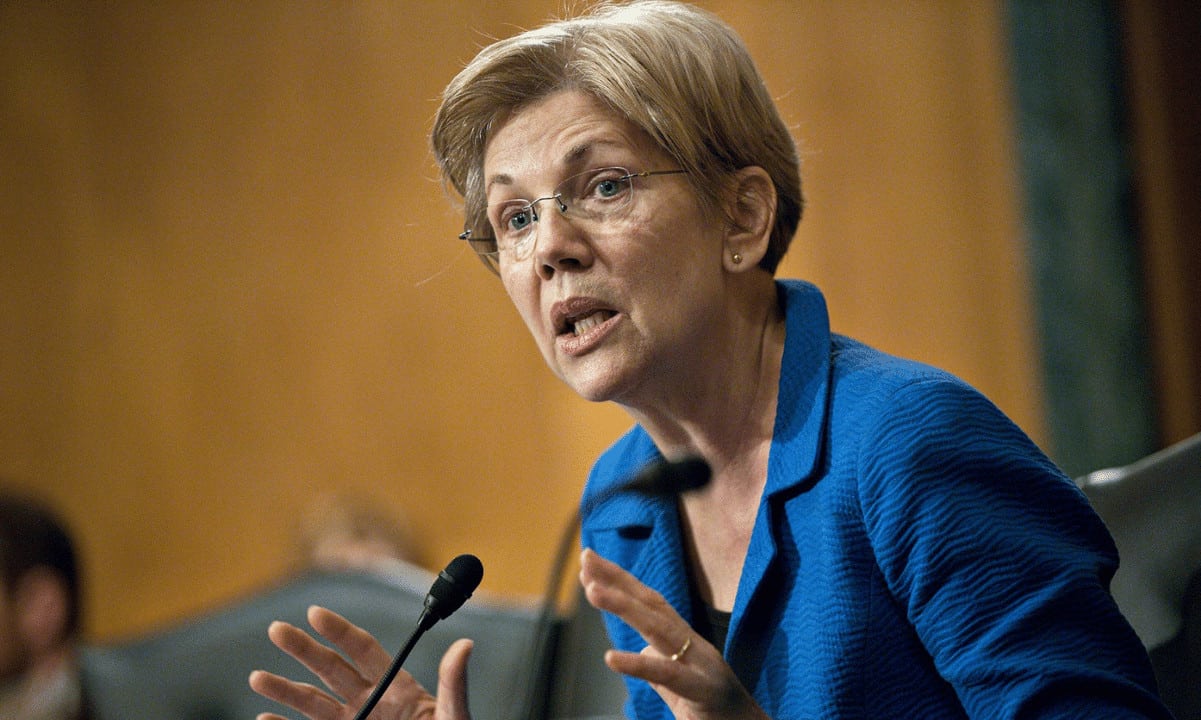

A recent move was the introduction of the Digital Asset Anti-Money Laundering Act, another bill aiming to curtail the use of cryptocurrencies in America.
On Dec. 11. the bill gained five new Senators as cosponsors, including, unsurprisingly, three members of the Banking Committee.
Crypto advocate Evan Van Ness posted a list of Senators he claimed were “paid off by the banks to cosponsor Elizabeth Warren’s anti-crypto bill,”
A list of US senators paid off by the banks to cosponsor Elizabeth Warren’s anti-crypto bill
* @RaphaelWarnock (D-GA)
* @LaphonzaB (D-CA)
* @ChrisVanHollen (D-MD)
* @Hickenlooper (D-CO)
* @benraylujan (D-NM)
* @RogerMarshallMD (R-KS)
* @JoeManchinWV (D-WV)List continues
— Evan Van Ness
(@evan_van_ness) December 11, 2023
As if confirming the notion, Warren said,
“When it comes to banking policy, I don’t usually agree with the CEOs of multi-billion dollar banks. But enforcing anti-money laundering rules against crypto to protect national security is common sense and critical.”
Banning Bitcoin in America
Neeraj Agrawal from cryptocurrency policy think tank Coin Center said the bill was a “direct attack on technological progress and also a direct attack on our personal privacy and autonomy.”
He added that the bill may be a potential solution to money laundering and terrorism financing but:
“The bill is in fact a repudiation of liberal values and a move towards the types of surveillance and control prized by authoritarians like Vladimir Putin, Xi Jinping, and Kim Jong-un.”
The Digital Asset Anti-Money Laundering Act is a direct attack on technological progress and also a direct attack on our personal privacy and autonomy.
Make no mistake, while proposed as a solution to potential money laundering and terrorist financing, the bill is in fact a… pic.twitter.com/8oID1wECGL
— Neeraj K. Agrawal (@NeerajKA) December 11, 2023
The bill aims to tighten America’s money laundering rules by classifying crypto companies, miners, and applications, such as non-custodial wallets, the same as financial institutions under the Bank Secrecy Act.
Head of research at Galaxy, Alex Thorn, said the bill was effectively a ban on BTC in the United States.
“Requiring non-custodial open-source software to perform bank-like compliance is *the big attack* Bitcoin’s enemies have always threatened. It’s impossible for Bitcoin Core, for example, to comply with this, so it amounts to an effective ban of Bitcoin in the USA.”
He added that these rules “effectively ban crypto in America,” fundamentally undermining the core innovation itself – peer-to-peer digital cash.
Dont Panic Yet
However, MV Capital partner Tom Dunleavy pointed out that the vast majority of Senator Warren-sponsored bills over the past few years have not passed Congress.
Bitcoin pioneer Jameson Lopp said that in her decade as a senator, Elizabeth Warren has introduced 315 bills. “Only one has been enacted into law,” he noted before adding, “That’s a 0.32% success rate.”
Warren sponsored:
36 bills in the 118th congress (2023-24). 0 passed.
103 bills in the 117th congress (2021-22). 0 passed.
98 bills in the 116th Congress (2019-20). 0 passed.
80 bills in the 115th congress(2017-18). 0 passed.
27 bills in the 114th congress. (2015-16). 0 passed. https://t.co/Tyyjw7F7V9— Tom Dunleavy (@dunleavy89) December 11, 2023
Binance Free $100 (Exclusive): Use this link to register and receive $100 free and 10% off fees on Binance Futures first month (terms).
The post appeared first on CryptoPotato







